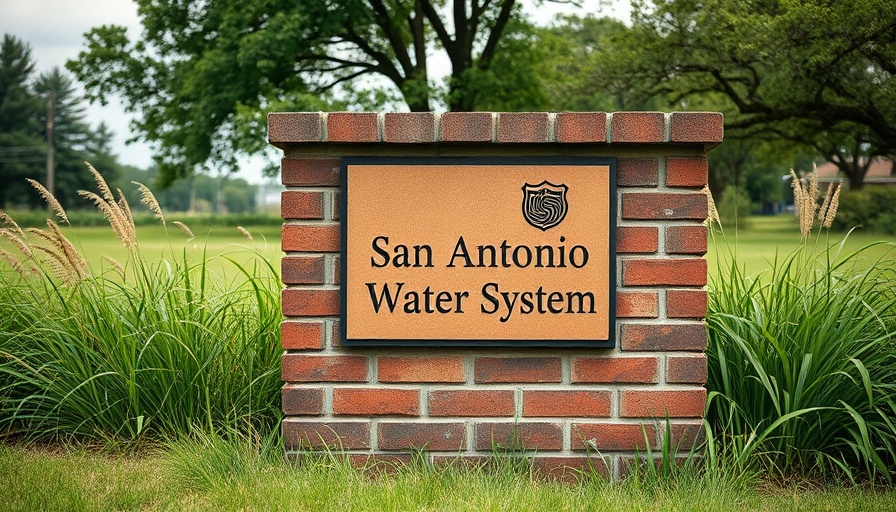
Transforming Water Access in San Antonio: The Role of New Lien Strategy
In a proactive move to protect renters from the consequences of unpaid bills by landlords, the City of San Antonio is considering a new proposal that would allow the San Antonio Water System (SAWS) to place liens on properties with significant overdue balances. This measure aims to safeguard tenants who are unfairly punished for the financial mismanagement of their apartment owners.
The Impact of Water Shutoffs on Renters
In June 2024, the city faced a significant crisis when SAWS shut off water at four rental properties due to unpaid bills totaling more than $280,000. This not only affected the residents of these complexes but also sparked outrage among city council members who emphasized the necessity of defending responsible renters from the recklessness exhibited by some landlords. Councilman Jalen McKee-Rodriguez articulated a prevalent frustration, stating, "This is an unfair treatment of renters who pay their bills diligently while their landlords neglect their responsibilities."
Understanding the Proposal: Enhanced Oversight for Property Owners
SAWS CEO Robert Puente highlighted that the new strategy is primarily focused on putting pressure on what he described as "delinquent, deadbeat apartment owners." If the proposal passes, landlords would face the risk of liens – a development that could complicate future property transactions for these owners. By advancing this initiative, the city council seeks not only to ensure water continuity for residents but also to hold property owners accountable for financial discrepancies.
How Will This Affect Future Tenants and Property Management?
The implications of the proposal extend well beyond the immediate future. By implementing liens, the city aims to foster an environment where property owners are more diligent in managing their finances, thus securing water access for tenants. Property Development Services Director Michael Shannon outlined that lenders often prefer not to see liens on properties, potentially prompting landlords to take their payment obligations more seriously. Additionally, properties facing liens may be subject to increased scrutiny, leading to enhanced apartment inspections for those that repeatedly default on payments.
The Broader Picture: Increasing Transparency and Communication
As part of its strategy, SAWS has ramped up communication with apartment complexes owing substantial amounts. Feedback from these complexes is crucial, as it enables SAWS to alert tenants proactively in case of impending shutoffs. Puente emphasized the importance of warning renters: “They need to know that their water may be shut off, so they can prepare accordingly, filling bathtubs or securing jugs of water ahead of time.” Ensuring clear communication becomes essential to empower renters, as awareness of potential shutoffs allows for preventive measures.
Statistics Behind Delinquency and Future Trends
Currently, nine complexes in San Antonio owe at least $50,000 each to SAWS, some being as much as 20 to 24 months in arrears. This financial delinquency is not just a local issue but reflects broader struggles faced by renters and landlords across the state, provoking considerations of legislative reforms. As droughts and water scarcity grow more prevalent, the push for improved financial responsibility within property management becomes even more pressing.
Potential Counterarguments and Divergent Perspectives
While the lien approach has support, it isn’t without criticism. Some advocates argue that punitive measures like liens may ultimately endanger the integrity of housing within San Antonio. They warn that this could lead to increased evictions and homelessness, exacerbating an already difficult housing market. Finding a balance between ensuring financial accountability for landlords and safeguarding tenants' rights is paramount, and it's crucial that city officials consider all angles and perspectives as they deliberate on this matter.
What Lies Ahead? Predicted Outcomes and Opportunities
If this proposal passes, it could mark a transformative shift in how San Antonio handles water service issues related to rental properties. Will this strategy effectively reduce the number of apartment complexes allowing bills to go unpaid? Only time will tell, but proactive measures may indeed usher in a new era of accountability and heightened awareness among both property managers and tenants.
As we await the council's final decision on this matter, it's important for residents to remain informed and engaged. If you live in a rental complex or are concerned about the ramifications of such measures, reach out to your city council representatives to express your views. Your voice matters in shaping the future of utility management in San Antonio.
 Add Element
Add Element  Add Row
Add Row 



 Add Row
Add Row  Add
Add 


Write A Comment